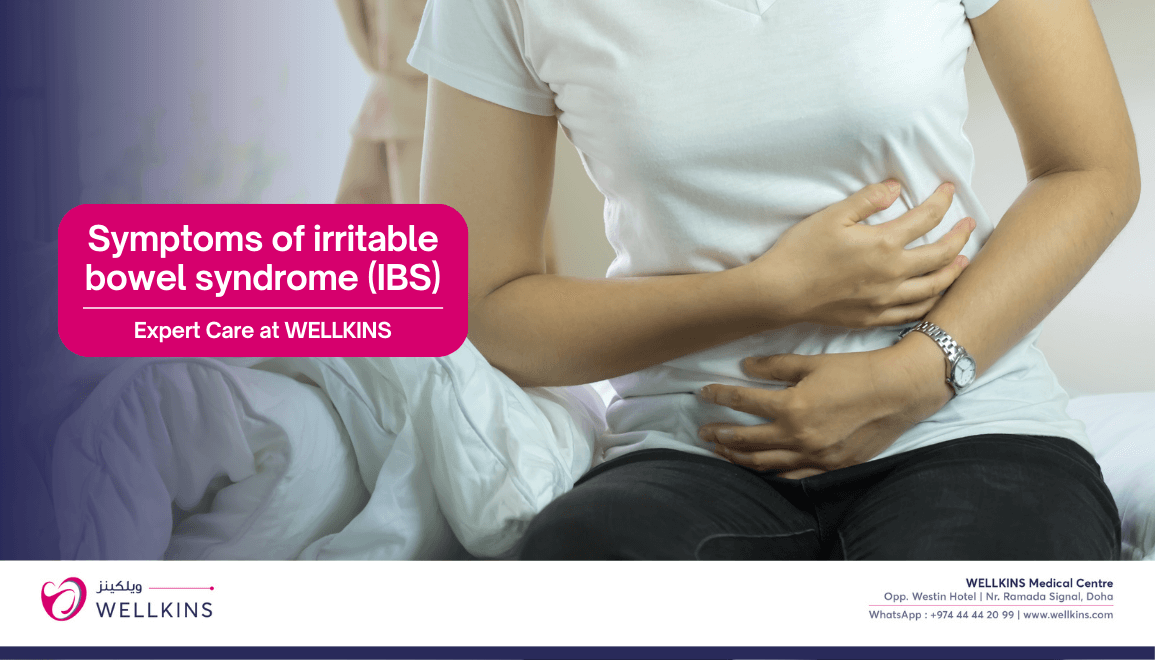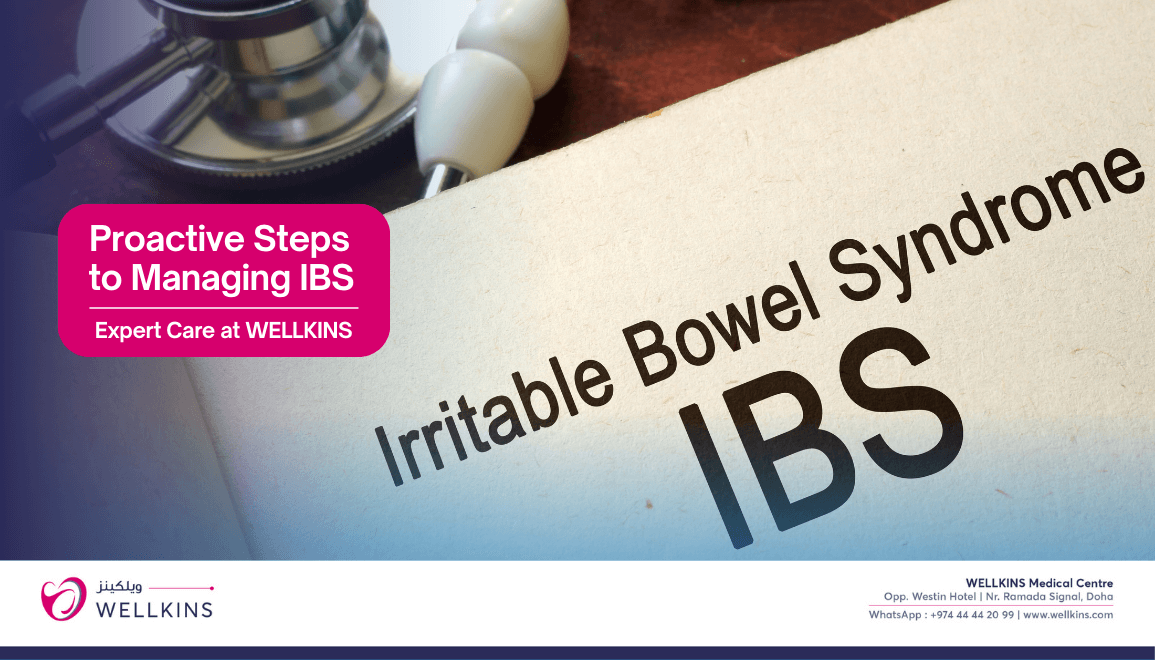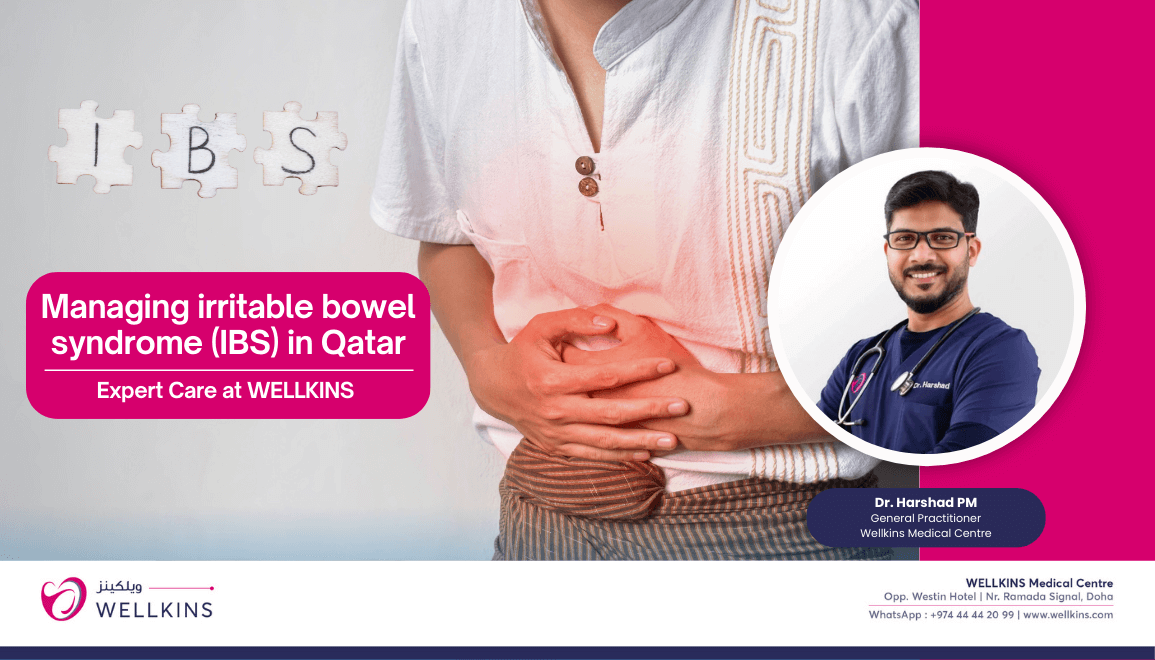Author: Dr. Harshad PM, General Practitioner at Wellkins Medical Centre
Do you frequently experience abdominal pain, bloating, or unpredictable changes in your bowel habits, such as alternating between diarrhea and constipation? These uncomfortable and often embarrassing symptoms could be more than just a fleeting stomach upset; they might be signs of irritable bowel syndrome (IBS). While many people in Qatar might attribute these issues to a bad meal or temporary stress, if they persist and significantly impact your quality of life, they are signals that your body needs attention. The good news is that IBS is a manageable condition, and finding lasting relief is possible with the right medical guidance.
Irritable bowel syndrome (IBS) is a common condition that affects millions of people around the world. IBS symptoms can develop suddenly and cause severe discomfort. Fortunately, there are steps you can take to prevent acute flare-ups and reduce the risk of getting them in the first place.
Understanding IBS: It’s More Than Just a “Nervous Stomach”
IBS is a common disorder that affects the large intestine. Unlike other digestive diseases, IBS does not cause permanent damage to the intestine or lead to more serious conditions like inflammatory bowel disease. However, its symptoms can be highly disruptive and frustrating, often referred to as a “functional” disorder because it involves a problem with how the gut and brain work together. Recognizing these signs early is crucial for effective management and restoring comfort.

Symptoms of Irritable Bowel Syndrome (IBS)
The symptoms of IBS can vary widely from person to person. They are often chronic and tend to wax and wane over time. Common indicators of IBS include:
- Abdominal Pain or Cramping: The hallmark symptom of IBS, often relieved after a bowel movement.
- Bloating and Gas: A feeling of fullness or swelling in the abdomen, which can be accompanied by an increase in gas.
- Changes in Bowel Habits: This can manifest as diarrhea (IBS-D), constipation (IBS-C), or a mix of both(IBS-M).
- Mucus in the Stool: The appearance of clear or white mucus in a bowel movement.
- Feeling of Incomplete Evacuation: The sensation that you haven’t fully emptied your bowels after a movement.
What Causes IBS?
The exact cause of IBS is not fully understood, but it is believed to be a combination of several factors, including:
- Gut-Brain Dysregulation: The nerves in your gut and brain may be overly sensitive, leading to amplified pain signals.
- Intestinal Muscle Contractions: Stronger or weaker contractions than normal can affect the speed of food movement through your intestines.
- Microbiome Imbalance: Changes in the gut bacteria (microbiome) can play a role.
- Food Sensitivities: Certain foods can trigger symptoms in some individuals.
- Stress and Mental Health: Psychological stress, anxiety, and depression can worsen IBS symptoms.
When to Seek Medical Attention
While an occasional bout of digestive discomfort is normal, persistent or severe symptoms of IBS warrant a medical evaluation. It’s important to consult a doctor if:
- Your symptoms are frequent and interfere with your daily life, work, or social activities.
- You experience unexplained weight loss.
- You have a fever.
- You have blood in your stool.
- Your symptoms wake you up from sleep.
- You have persistent or severe diarrhea.
These could be signs of a more serious condition that requires a different diagnosis and treatment.

Proactive Steps: Managing IBS
While many people in Qatar and around the world live with the discomfort of IBS, the most effective strategy is a proactive approach to managing your symptoms. By making conscious choices, you can significantly reduce the frequency and severity of flare-ups and regain control of your life.
Understanding the Root Causes: Why Management Matters
IBS is not curable, but it is highly manageable. The goal of any management strategy is to identify and address the triggers that cause your gut-brain axis to overreact. These triggers can be different for everyone, but they commonly include:
- Dietary Triggers: Certain foods, like those high in FODMAPs (fermentable oligosaccharides, disaccharides, monosaccharides, and polyols), can cause gas and bloating.
- Stress: The strong connection between the brain and gut means that stress can directly impact gut function.
- Lifestyle Habits: Poor sleep and a lack of exercise can exacerbate symptoms.
By addressing these factors head-on, you can take a powerful step towards a life with fewer IBS symptoms.
1. Mindful Eating and Dietary Changes
What you eat is one of the most significant factors in managing IBS.
- Identify and Avoid Trigger Foods: A food diary can help you pinpoint specific foods that worsen your symptoms. Common culprits include dairy, gluten, high-FODMAP foods (e.g., onions, garlic, certain fruits), and carbonated drinks. A low-FODMAP diet, guided by a healthcare professional, can be a highly effective tool.
- Eat Smaller, More Regular Meals: Large meals can put a strain on your digestive system. Opt for five to six smaller, balanced meals throughout the day instead of three large ones.
- Stay Hydrated: Drinking plenty of water is crucial, especially if you have IBS-C, as it helps soften stool and ease constipation.
2. Lifestyle Modifications
Beyond diet, your daily habits play a critical role in preventing IBS flare-ups.
- Manage Stress: Stress is a major trigger for IBS. Incorporate stress reducing activities into your routine, such as meditation, yoga, deep breathing exercises, or spending time in nature.
- Regular Exercise: Physical activity can help regulate bowel function, reduce stress, and improve overall gut health. Aim for a regular exercise routine that works for you.
- Get Enough Sleep: Poor sleep can disrupt the gut-brain axis. Prioritize getting 7-9 hours of quality sleep per night.

Dealing with irritable bowel syndrome (IBS) can be a confusing and overwhelming journey. The constant worry about symptoms and the struggle to find a solution can feel isolating. But you don’t have to navigate this path alone. Professional guidance is a crucial step toward taking control of your health and finding relief.
At Wellkins Medical Centre, we understand the complexities of IBS. Our approach is to provide a swift and accurate diagnosis, followed by a collaborative partnership to build a personalized management plan just for you. This isn’t a one-size-fits-all solution; it’s a comprehensive strategy designed to address your unique needs. We explore a range of effective methods, from dietary management and stress reduction techniques to, when necessary, medication to target specific symptoms like diarrhea or constipation. Our goal is to support you with the tools and knowledge you need to manage your condition effectively and reclaim your quality of life. Imagine a life where you no longer live in constant fear of flare-ups, but instead, with the freedom and comfort you deserve.
To book an appointment at wellkins here: https://wellkins.com/visit






